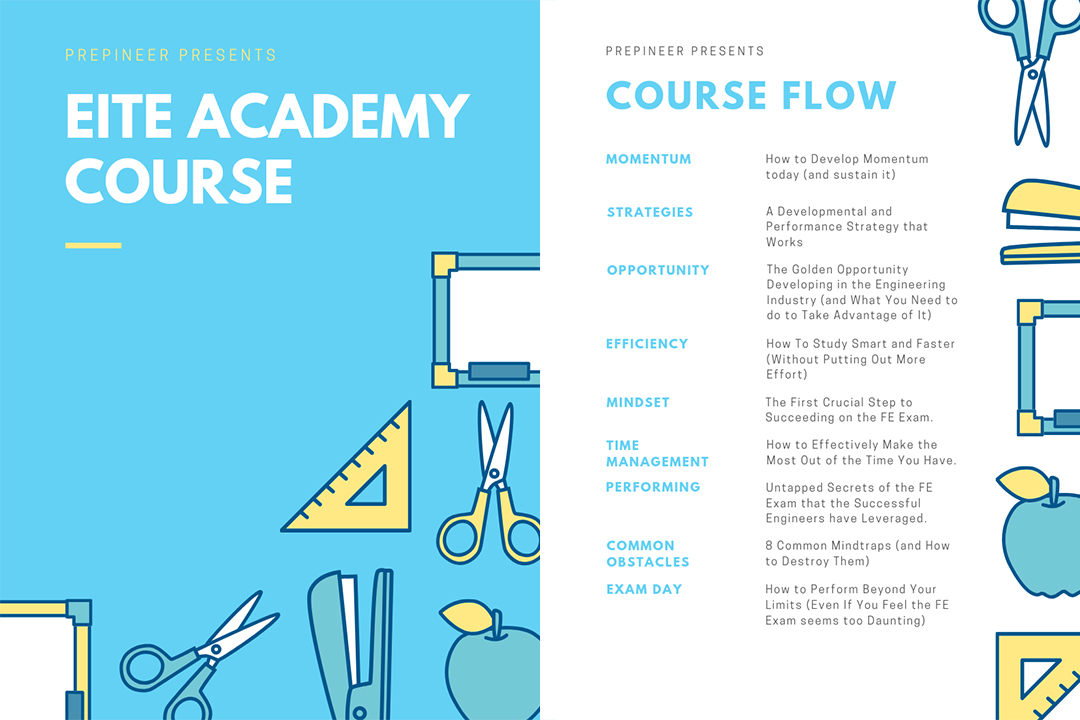Practice Exams:
I have touched on this a couple of times throughout my guide, and I will stress the importance once again. Practice Exams are a must in your preparation for the Engineer in Training Exam. There is no point to going in to arguably one of the most important exams of your life blind, with no knowledge of what the format and type of questions will be asked.
Practice exams should be used early and often throughout your studies. Prior to opening up your book for your first study session, set aside a good couple of hours to sit down and take a high quality practice exam. This will not only set a baseline for where you started in your studies, but also give you a metric to compare against as you progress. The results of these exams will show you where you stand and how much you need to work on in the certain areas you lack knowledge.
Get Started!
There is a Chinese proverb that states that the longest journey is started with a simple first step. In this they mean that it isn’t until you start a project, or in this case hitting the books, that you really understand how much of what needs to be done to complete it. There is only so much theory one can develop, details aren’t always evident until you are in the midst of it all.
There is another proverb that states that “perfection is the enemy of good”. This is especially true when this perfection holds you back from starting something. Are you waiting to get out of that certain class to start studying? Maybe you are waiting to see if you get promoted to that new position? What’s holding you back from taking the first step, to commit to dominating the Engineer in Training exam?
What I am getting at here is simple, at this point, you have all the planning, you have thought out your journey, get something done! Given that you have ample time to prepare for the exam, you will be able adjust on the fly as needed after you begin.
So before we go any further, what can you get done today? Open that book, turn to the first chapter, and crank out some review, get those wheels rolling, let’s do this together.
Take good notes.
I am sure we can all go pro when it comes to taking notes. Through all the college classes we have had, we could probably all publish a thousand books each. I know it’s a basic concept, but stemming from my experience with the Engineer in Training exam, it’s one point I would like to rehash. Here are some tips on maintaining good notes throughout your studies.
- Take notes during all your study sessions. Use a single large spiral bound notebook to consolidate all your notes in to one easy to reference location.
- Give high priority to vocabulary. I make this point because language is a fundamental tool that can make or break you on exam day. If you run through an exam problem and don’t know what a term means, you are going to spend unnecessary time boggling it in your mind. This can be a huge handicap in your efficiency.
- Cruise through the chapter you will be studying and give it a cursory review to get a gist of what you will be covering in your session. When you have finished, return to the beginning and review it in more detail making sure to focus on understanding the concepts. Don’t just read the words, engage in the concepts. If you come across a term you don’t understand, write it down in your notes and look it up using the internet or some other resource.
- Don’t write down every word that you read, but at the same time, don’t leave out major theories and/or topics just to save space. If you feel the information you are reading is something that needs to be retained, write it down. Focus on capturing the sequence of the subject starting with the main topic, flowing into each subtopic and on to their subsequent equations, definitions, etc.
- Write your notes down in an outline type format. The organization of the theories is as significant as the substance of those theories.
- Color highlight the important points in both your book and written notes to reemphasize and further retain.
- It may also be useful to you to write notes, points, or reminders in the margins of each chapter.
- Stay organized with your note taking, if you are confused, it can become your worst enemy and a major roadblock to any progress.
Review your notes
Wax on, wax off. Sometimes it’s hard for us to grasp just how important repeating a task can be. In sports they say practice makes perfect, but it’s not just practice, its perfect practice that makes perfect. Writing notes and forgetting about them can be seen as sloppy practice. You aren’t really doing much to retain the information that you are flagging as important. To maximize the information you retain, dedicate time before each study session to sit down and rehash your written notes.
There is research out there that proves that reviewing notes within 24 hours of being exposed to the information will increase you rate of retention by 60%! Think about the progress that can be made within a couple of days; you will rapidly be building a knowledge empire in your mind. If you want to significantly cut down on the time spent studying, this is the task to start incorporating.
On top of reviewing prior to every study session, dedicate some time weekly to do a full review of what was covered in the week prior. If you developed a study schedule based of my recommendations, then you will be starting a new section every Wednesday. With that, take time on the Tuesday prior to starting the new week to review your notes and assess your overall understanding.





